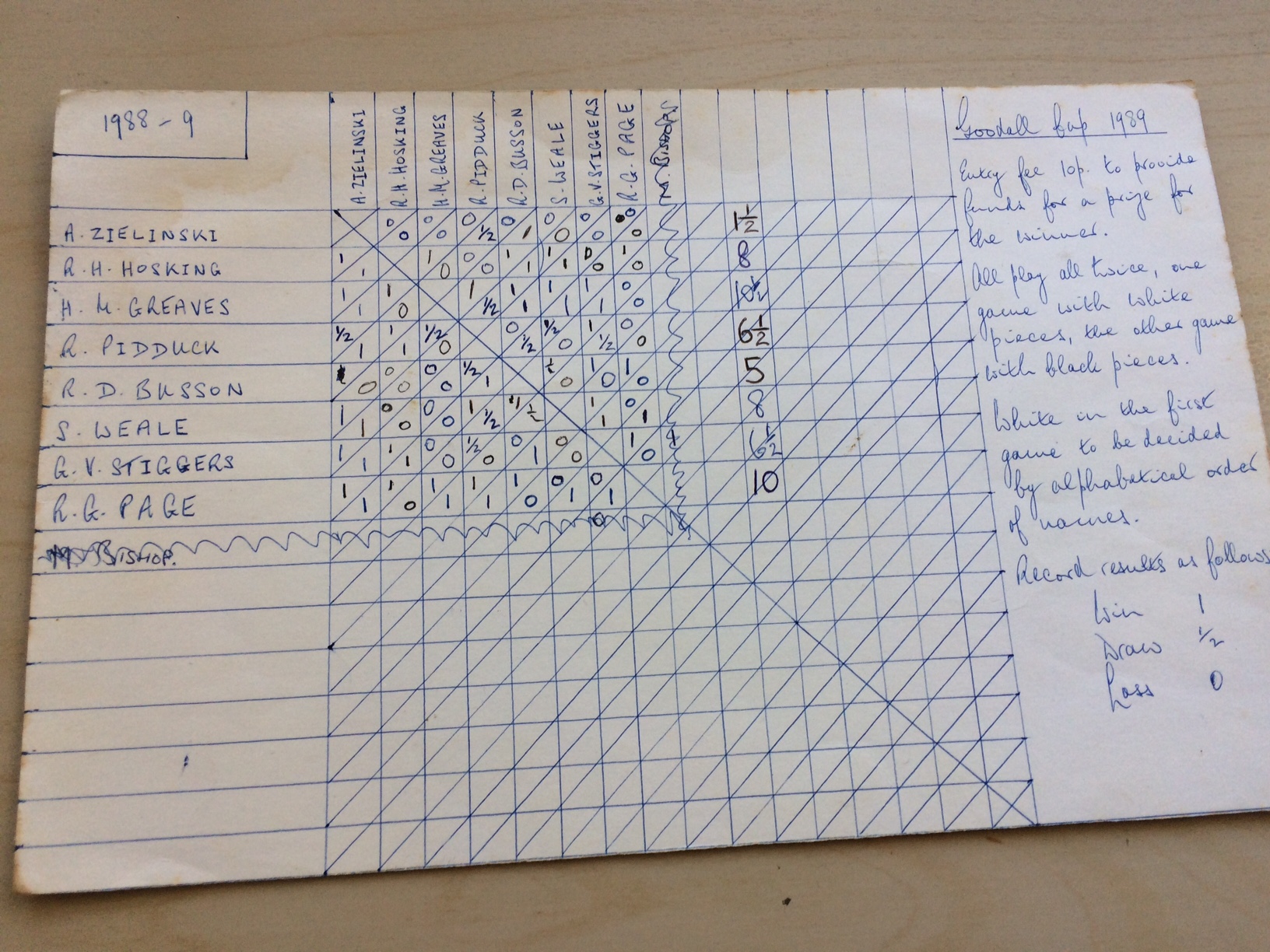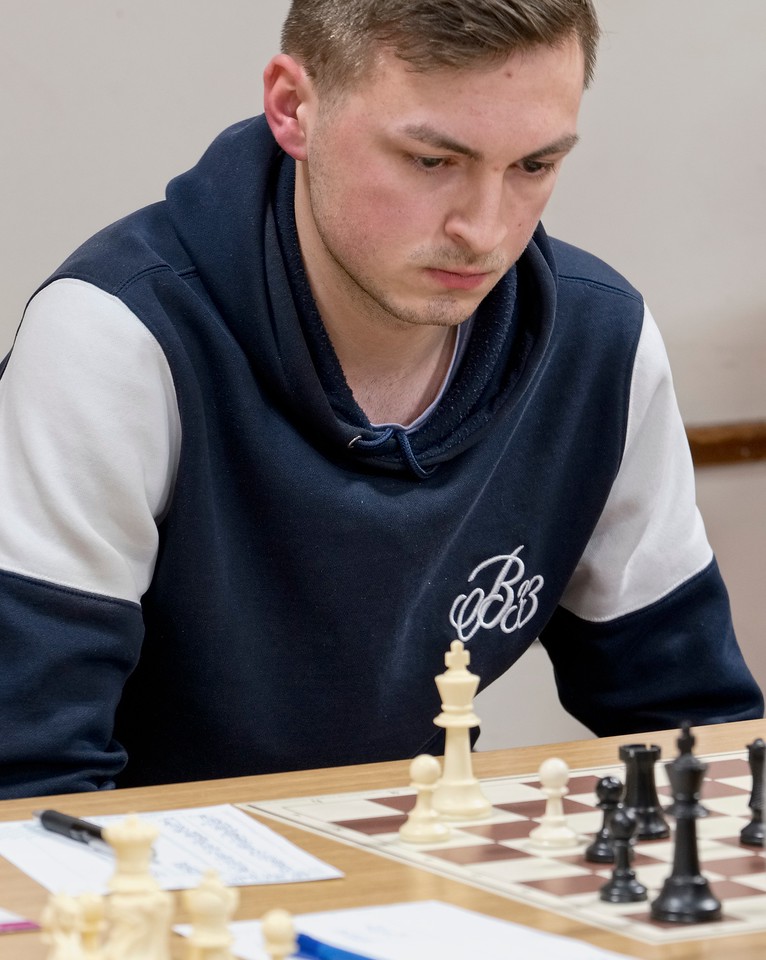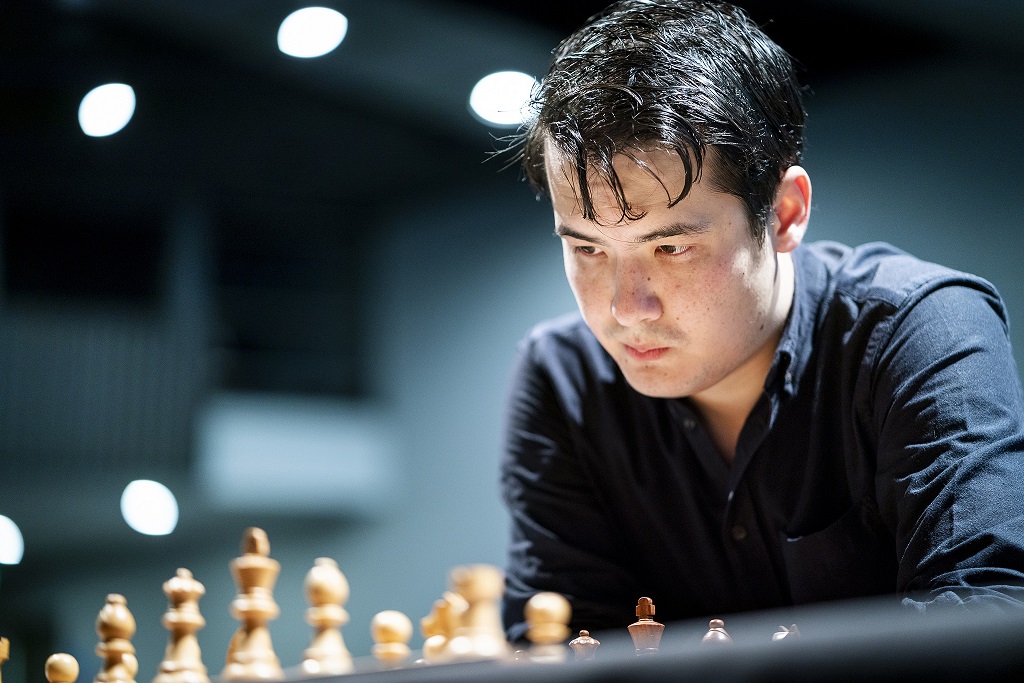In 1990 the British Chess Championships were held in Eastbourne in the middle of a heatwave. Stewart Reuben began an early question and answer session with the following greeting: “Welcome to the hottest British Championships on record!” But it was August and heatwaves are more common then than in February when the Kidlington Congress is traditionally held. The 42nd Congress took place two weeks ago and a glance at the photo of the venue above shows that players faced very different conditions and challenges even before they sat down to play chess.
Kidlington has long been a regular feature of the chess tournament calendar on the first full weekend in February. The first Kidlington Chess Tournament was held in 1978. It had two sections and offered a guaranteed minimum prize fund of £130. In its second year Exeter Hall became the venue where it has remained ever since. In 1981 an intermediate section was added and in 2012 a fourth section for Under-120 players. The Open section serves as the second leg of the Oxfordshire Individual Championship with the County Champion being the eligible player with the highest combined score in the Open sections of the two weekend tournaments held in Oxfordshire during the season, namely the relatively new autumn congress at Witney (2018 was its sixth year) and the Kidlington tournament.
The congress is very popular: for the past two years it has played to a full capacity (192) and the maximum was reached this year with ten days to go. A waiting list was established which proved to be a good idea as the weather took its toll and there were some withdrawals but fortunately fewer than expected according to Gerard O’Reilly, lead organizer since 2012, and the total of 180 on such a weekend is still impressive. The venue is unusual: all the chess is played in one room but there is a pit in the middle housing the U180 and U145 sections while the U120 and the Open take place on the surrounding raised section. Chess Direct provided the bookstall so it was good to have a chat with Andrew Butterworth who used to be a regular fixture at the Thanet Congress. An innovation that caught the eye of this writer was the team prize. Players were invited to form teams of four from any of the sections and their final scores were combined with the prize going to the highest-scoring team.
The Open section was small (21) but competitive and it is always satisfying when the two players in contention for first place are drawn against each other in the final round and so it proved this time. Marcus Harvey (left) had already come first equal at the ‘sister’ tournament at Witney so he had an extra incentive to win at Kidlington. Unfortunately, in his way stood (or sat) the formidable weekend specialist, Mark Hebden. However, youth prevailed, and Marcus became the Oxfordshire Individual Champion for the first time.
White: FM Marcus Harvey (231) Black: GM Mark Hebden (238)
Kidlington Chess Congress 2019
Broadstairs Chess Club is currently in a healthy position in many ways. Firstly, the club is financially sound with a secure venue that has been its home for the best part of seventy years. Secondly, results this season have been very encouraging. The club has already won the Mick Croft Cup and the Team Quickplay while all three league teams are well placed in their respective divisions: the Millar Cup team is second, the Hargreaves Shield team is top with a 100% record while the Walker Shield team is second in an increasingly tight league with several matches still to play. Finally, team spirit is good. The new players have been a magnificent addition to the club and appear to be enjoying their chess. All have made significant contributions to the club’s success as is evident from the latest ECF grades. To quote two examples, Paul Johnson’s grade has gone from 116 to 129 while Richard Clement has improved from 129 to 145. Amazing! One consequence of this influx of new players is that the internal club competitions have become extremely competitive and the end of the season promises to be very exciting. Wisely, the stronger players have largely avoided each other at this stage and appear to be circling like wild animals waiting for the other to make the first move.
The Goodall Cup, the club championship, is intriguingly poised at this half-way stage. The excellent ECFLMS site has all the results which can be viewed on a regular basis with weekly updates. A glance at the statistics (click here) shows that the leaders – if we go by highest percentage success rate and games played – at this stage are as follows:
1st Richard Clement 100% (10 games played)
2nd= David Faldon 100% (5)
Arnaud Wisman 100% (5)
4th Trefor Owens 81.82% (11)
5th Paul Johnson 79.17% (12)
A lot can happen with 19 games to play altogether and much will depend on results when the mighty stags lock horns. In the meantime, Richard Clement is the early front-runner. Can he keep it up? Watch this space.
The situation in the knockout competition for the John Couzens Vase is similar. This is, of course, a time handicap and at the AGM it was agreed to tighten the rules this year so that the minimum time for the stronger player has now been reduced from 7½ minutes to five. This is in a two-hour game so that in such pairings the weaker player gets one hour and fifty-five minutes! The aim is to allow everyone a reasonable chance of winning the competition but it has not quite had the desired effect yet with most the big guns still firing. However, we shall see as sooner or later the stronger players may well play each other but will that allow one of the outsiders to sneak up on the inside?
There was an excellent turnout at the club last Monday with 18 of the 20 regular members playing which is another positive sign. Broadstairs has never been a large chess club and a glance at the archives bears this out.
 Here we have a copy of the Goodall Cup sheet from thirty years ago. The first thing to notice is that only eight players took part – this season it is twenty – and the second is that it was an all-play-all twice competition. This was common in those days until increased membership meant that more than twenty games would have to be played. The handwriting is that of George Stiggers, long-time secretary and treasurer of the club. Note the entry fee of 10p ‘to provide funds for a prize for the winner’. Not sure when that was abolished but there is no financial reward today just the kudos of winning and your name on the trophy. Note also that ‘White in the first game to be decided by alphabetical order of names’. This was a permanent gripe of Alek Zielinski’s as he was destined forever to play all his games as Black before once playing as White. (At the time I tried to find if there was anyone on the ECF list with a name that would come after Alek’s alphabetically and there was only one, Malcolm Zukunft, who was a member of Herne Bay Chess Club, only a few miles away from Broadstairs.) Finally, look at the results: Mac Greaves won by half a point to record the eighth of his nine Goodall Cup victories, a total that was matched in 2018 by David Faldon. Will 2019 see David become the first player to win ten Goodall Cups? This could be his toughest test yet.
Here we have a copy of the Goodall Cup sheet from thirty years ago. The first thing to notice is that only eight players took part – this season it is twenty – and the second is that it was an all-play-all twice competition. This was common in those days until increased membership meant that more than twenty games would have to be played. The handwriting is that of George Stiggers, long-time secretary and treasurer of the club. Note the entry fee of 10p ‘to provide funds for a prize for the winner’. Not sure when that was abolished but there is no financial reward today just the kudos of winning and your name on the trophy. Note also that ‘White in the first game to be decided by alphabetical order of names’. This was a permanent gripe of Alek Zielinski’s as he was destined forever to play all his games as Black before once playing as White. (At the time I tried to find if there was anyone on the ECF list with a name that would come after Alek’s alphabetically and there was only one, Malcolm Zukunft, who was a member of Herne Bay Chess Club, only a few miles away from Broadstairs.) Finally, look at the results: Mac Greaves won by half a point to record the eighth of his nine Goodall Cup victories, a total that was matched in 2018 by David Faldon. Will 2019 see David become the first player to win ten Goodall Cups? This could be his toughest test yet.
There was an article in the paper recently extolling the virtues of certain English expressions unknown to Americans which have to be explained by expats to their friends stateside. One of those mentioned was ‘car crash’ which as an idiom we understand as a minor disaster or calamity. This is probably the best way to describe the following game. White, aware of Black’s familiarity with the French Defence, decides unwisely to try something different. This was a mistake because while avoiding the French, he walked into Black’s other speciality, the Dutch. Marvellous – if it’s not the French, it’s the Dutch. I blame Brexit, he thought ruefully afterwards. In fact, despite the obvious discomfort of black pawns on d5 and f5, coupled with knights on e4 and f6, White managed to achieve some sort of respectability with the exchange of minor pieces. However, an ill-considered decision to bring his king to the queenside in anticipation of further exchanges proved his undoing and after Black’s clever 27….Qh4, Stockfish took a dim view of White’s position. From then, as they say, it was all downhill and Black finished the game neatly.
White: Robert Page (142) Black: Reg Pidduck (102)
Goodall Cup (Broadstairs Club Championship)
With over 90 grandmasters in the field, the Gibraltar Masters which has just concluded was never going to be a stroll for anyone and choosing a winner was probably like doing the same in the Grand National. For those wondering why Lev Aronian, Wesley So, Hikaru Nakamura and Maxime Vachier-Lagrave were not at Wijk aan Zee, here is your answer: they were in Gibraltar and not having an easy time of it either. While it would be churlish not to acknowledge the winner, the Russian GM Vladislav Artemiev on 8½/10, it should be noted that So, MVL and Nakamura finished 11th, 13th and 16th respectively on 7/10 while Aronian finished 24th on 6½/10. The three leading British players performed with great credit in such a strong field: Michael Adams came 14th with 7/10 and Gawain Jones 32nd on 6½/10 but the star of the show as far as the Brits were concerned was David Howell who finished an excellent 4th with 7½/10. He lost only one game – of which more anon – and in the last two rounds drew with Nakamura (world number 16) and beat Aronian, the world number 10 and World Championship semi-finalist with time to spare.
White: Lev Aronian (2767) Black: David Howell (2685)
Gibraltar International Chess Festival 2019
It’s Howell (White) to move. Stockfish has the position as equal (0.37) and if Howell had played the move the computer suggested (59.Kd3), it would still have been equal at 0.37. However, Howell played 59.Ke3??, a Howeller of the first degree. 59…Rxc3+! Ouch! If the pawn re-captures, Black’s b-pawn queens. Howell struggled on until move 81 but the game was up.
Broadstairs 3 Bridge 1
| 1 | Richard Clement (129) | 1-0 | Peter Blundell (118) |
| 2 | Chris Stampe (124) | 1-0 | Tim Spencer (118) |
| 3 | Gary Hilleard (118) | 0-1 | Graeme Boxall (93) |
| 4 | John Couzens (117) | 1-0 | Ian Redmond (80) |
Richard Clement writes:
John Couzens was heard to exclaim “What have I missed?” as he accepted a bishop sacrifice and not long after his opponent resigned. As John put it, “He came at me with all guns blazing and it just did not work”. Gary won a knight early on but his opponent spotted some resources and turned the game around so at this stage the match was in the balance. Chris won the exchange of a rook for a knight and his pair of rooks drove his opponent to resignation. Mine was the last game to finish. I managed to tie my opponent up in knots but when it came to making progress in the position I played a few moves which lost all my advantage. Luckily for me, his cramped kingside led him to lose most of his pawns and he resigned and the team won 3-1. No sweat.



